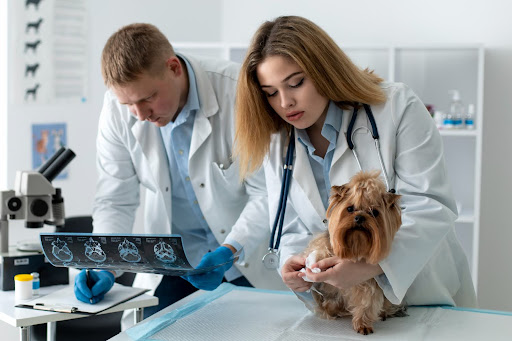Pets are beloved members of our families, bringing joy, companionship, and sometimes a little chaos into our lives. Just like humans, they can face health crises that require immediate attention.
In such situations, emergency pet hospitals play a vital role in providing urgent care and saving lives. This article explores the importance of emergency pet hospitals as essential resources in pet healthcare, highlighting their role, services, and significance in ensuring the well-being of our furry companions.
24/7 Availability: The Lifeline for Pet Emergencies
One of the most critical aspects of emergency pet hospitals is their round-the-clock availability. Unlike regular veterinary clinics, which operate during standard business hours, emergency pet hospitals are open 24/7, including weekends and holidays.
This accessibility is crucial because pet emergencies can occur at any time, often catching pet owners off guard. You can explore online resources to find the best pet clinics such as Black Mountain Animal Hospital.
Whether it’s a sudden illness, injury, or accident, knowing that emergency care is available at any hour provides immense relief and peace of mind to pet owners.
Immediate Medical Attention
When a pet faces a medical emergency, time is of the essence. Delaying treatment can exacerbate the condition and even jeopardize the pet’s life.
Emergency pet hospitals are equipped to provide immediate medical attention, ensuring that pets receive timely care when every second counts.
From trauma cases to severe illnesses, skilled veterinarians and support staff in these facilities are trained to assess and stabilize pets quickly, alleviating pain and minimizing further complications.
Comprehensive Diagnostic Capabilities
Diagnosing the underlying cause of a pet’s emergency condition is crucial for effective treatment. Emergency pet hospitals are equipped with advanced diagnostic tools and equipment to facilitate rapid and accurate assessments.
From X-rays and ultrasound to blood tests and CT scans, these facilities offer a comprehensive range of diagnostic capabilities to evaluate the pet’s health status thoroughly.
This enables veterinarians to make informed decisions regarding treatment plans and interventions, optimizing the chances of a positive outcome.
Specialized Emergency Care
Not all pet emergencies are alike, and some may require specialized care beyond standard medical interventions. Emergency pet hospitals employ veterinary specialists and board-certified clinicians who have expertise in various fields such as emergency and critical care, surgery, internal medicine, and cardiology.
These specialists collaborate to provide tailored treatment plans tailored to the unique needs of each patient. Whether it’s administering emergency surgery, managing a critical illness, or providing intensive care, specialized expertise ensures that pets receive the highest standard of care during emergencies.
Critical Care and Monitoring
Pets with severe injuries or critical illnesses often require intensive care and monitoring to stabilize their condition and support recovery. Emergency pet hospitals are equipped with dedicated critical care units staffed by experienced veterinary professionals who specialize in managing critical cases.
These units are equipped with advanced monitoring equipment to track vital signs, administer medications, and provide supportive therapies as needed. Continuous monitoring allows veterinarians to promptly identify any changes in the pet’s condition and adjust treatment protocols accordingly, optimizing the chances of a positive outcome.
Collaboration with Primary Care Veterinarians
Emergency pet hospitals complement the services provided by primary care veterinarians, forming an essential part of the pet healthcare ecosystem. In cases of emergency, primary care veterinarians often refer their clients to emergency pet hospitals for urgent care beyond their scope of practice.
Following treatment, emergency hospitals communicate with the pet’s primary veterinarian to provide comprehensive medical records and updates, ensuring continuity of care.
This collaborative approach fosters a seamless transition between emergency and primary care settings, ultimately benefiting the pet’s overall health and well-being.
Education and Outreach
In addition to providing emergency care, pet hospitals play a crucial role in educating pet owners about emergency preparedness and pet safety.
Many emergency hospitals offer resources and educational materials on recognizing common pet emergencies, administering first aid, and creating emergency preparedness plans.
By empowering pet owners with knowledge and skills, these hospitals help mitigate risks and potentially prevent emergencies. Outreach efforts also extend to community events, where emergency hospital staff engage with pet owners and provide valuable information on keeping pets safe and healthy.
Conclusion
Emergency pet hospitals are indispensable resources in pet healthcare, providing round-the-clock access to life-saving emergency care for our beloved companions.
With their immediate medical attention, comprehensive diagnostic capabilities, specialized expertise, and critical care services, these facilities play a vital role in safeguarding the health and well-being of pets in times of crisis.
By collaborating with primary care veterinarians and engaging in educational outreach, emergency pet hospitals contribute to a holistic approach to pet healthcare, emphasizing prevention, preparedness, and prompt intervention when emergencies arise.
As dedicated guardians of our furry friends, it’s essential to recognize and appreciate the invaluable role that emergency pet hospitals play in our pets’ lives.










